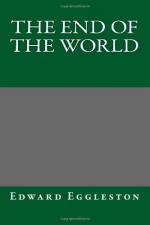“You have taken one farm, and therefore I must let my daughter marry a man with nothing but his two hands,” sobbed Mrs. Anderson.
“Two hands and a good head and a noble heart,” said Andrew.
“Well, I won’t consent,” said she. “If Julia marries him,” pointing to August, “she will marry without my consent, and he will not get a cent of the money he’s after. Not a red cent!”
“I don’t want your money. I did not know you’d get your farm back, for I did not know but that Walker owned it, and I—wanted—Julia all the same.” August had almost told that he had married Julia.
“Wanted her and married her,” said Andrew. “And I have not kept a corn-stalk of the property I got from you. I have given Bob Walker a ten-acre patch for his services, and all the rest I have deeded to the two best people I know. This August Wehle married Julia Anderson when they thought the world might be near its end, and believing that, at any rate, she would not have a penny in the world. I have deeded the river farm to August Wehle and his wife.”
“Married, eh? Come and ask my consent afterwards? That’s a fine way!” And Abigail grew white and grew silent with passion.
“Come, August, I want to show you and Julia something,” said Andrew. He really wanted to give Abigail time to look the matter in the face quietly before she committed herself too far. But he told the two young people that they might make their home with him while their house was in building. He had already had part of the material drawn, and from the brow of the hill they looked down upon the site he had chosen near the old tumble-down tenant’s house. But Andrew saw that Julia looked disappointed.
“You are not satisfied, my brave girl. What is the matter?”
“Oh! yes, I am very happy, and very thankful to you; and next to August I love you more than anybody—except my parents.”
“But something is different to what you wished it. Doesn’t the site suit you? You can look off on to the river from the rise on which the house will stand, and I do not know how it could be better.”
“It couldn’t be better,” said Julia, “but—’
“But what? You must tell me.”
“I thought maybe you’d let us live at the castle and take the burden of things off you. I should like to keep your house for you, just to show you how much I love my dear, good uncle.”
Even an anchorite could not help feeling a pleasure at such a speech from such a young woman, and this shaggy, solitary, misanthropic but tender-hearted man felt a sudden rush of pleasure. August saw it, and was delighted. What one’s nearest friend thinks of one’s wife is a vital question, and August was happier at this moment than he had ever been. Andrew’s pleasure at Julia’s loving speech was the climax.
“Yes!” said the Philosopher, a little huskily. “You want to sacrifice your pleasure by living in my gloomy old castle, and civilizing an old heathen like me. You mustn’t tempt me too far.”




